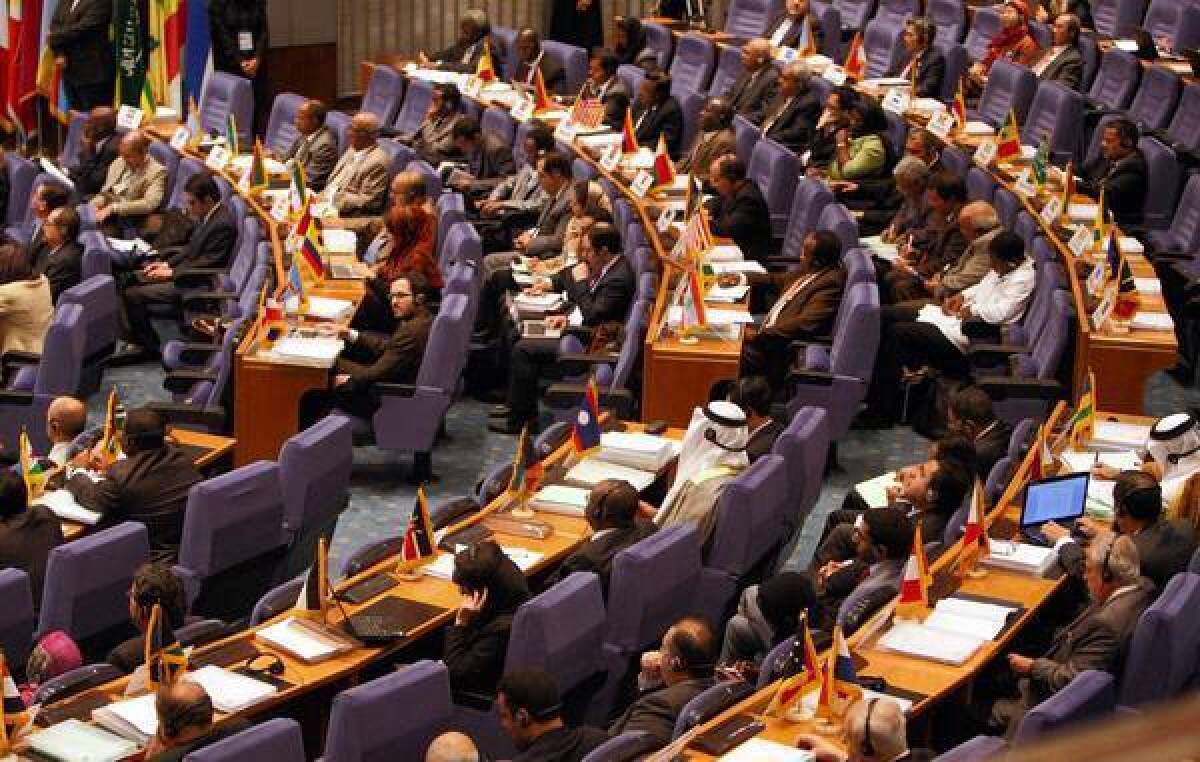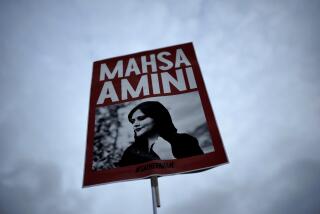Iran uses Non-Aligned Movement summit to criticize U.S., West

TEHRAN — Anti-Western symbolism was rampant across Iran’s capital city on Sunday as the Islamic Republic welcomed attendees of a weeklong gathering of nonaligned nations, a Cold War-era movement that Iranian officials have embraced as a counterweight to U.S.-led efforts to isolate their country.
As the sessions began, a balloon with a message hailing Iran as a “cradle of peace and justice” hovered near the site of the former U.S. Embassy, where Iranian militants held 52 people hostage almost 33 years ago.
At a major entranceway to the summit venue were arrayed three battered cars — the wrecks, officials said, of vehicles bombed to assassinate Iranian scientists. Iran blames Israel and the West for attacks that have killed at least five members of the nation’s scientific community in recent years.
INTERACTIVE: Who’s who of the Non-Align Movement
Security was extremely tight and authorities warned dissidents not to consider actions that might embarrass the government, despite calls for protests on social media and expatriate websites.
Authorities have declared a weeklong holiday and encouraged residents to leave Tehran to make room for the thousands of delegates from at least 118 nations scheduled to visit, according to the Foreign Ministry.
The Non-Aligned Movement traces its origins to the desire of such leaders as Yugoslav President Josip Broz Tito and former Egyptian President Gamal Abdel Nasser to chart a course independent of the Eastern and Western blocs in the 1950s and ‘60s.
Today, Tehran sees the group as a potential bulwark against international sanctions and the possibility of an Israeli or U.S. bombing strike aimed at its nuclear development program.
The gathering is shaping up as a global stage for Iran to thumb its nose at the United States and dispute Washington’s insistence that Tehran is an isolated rogue state and sponsor of terrorism.
INTERACTIVE: Who’s who of the Non-Align Movement
Iran, which is assuming the rotating presidency of the group, has highlighted the anticipated attendance of United Nations Secretary-General Ban Ki-moon — whose office says he is coming despite a personal plea from Israeli Prime Minister Benjamin Netanyahu that he stay away — and of President Mohamed Morsi of Egypt. Morsi would be the first Egyptian head of state to visit since the 1979 founding of the Islamic Republic.
Also expected to attend is India’s prime minister, Manmohan Singh, whose nation remains a major oil client of Iran. The foreign minister of North Korea, an ally of Tehran, arrived here Sunday, Iranian news media reported.
Meanwhile, in an apparent bid to calm a brewing controversy about competing Palestinian envoys, Prime Minister Ismail Haniyeh of the Hamas-ruled Gaza Strip has decided not to attend the conference, news agencies reported. The decision would seem to avert a potentially delicate diplomatic situation for Iran, a major backer of Hamas, a militant group. Palestinian Authority President Mahmoud Abbas had threatened to boycott the conference if Haniyeh attended. Abbas’ Fatah faction, which governs the West Bank, and Hamas are rivals.
“Many of us are victims [of] nefarious terrorist acts,” Iranian Foreign Minister Ali Akbar Salehi said in his opening remarks at the forum, accusing “some Western powers” of promoting terrorism.
The U.S. and Israel, however, have said Iran and its proxies have masterminded terrorist plots across the globe.
Iran’s top diplomat lauded the nation’s “peaceful nuclear program” and renewed Tehran’s call for a “nuclear weapons-free zone in the Middle East,” directly assailing Israel, widely believed to be the region’s sole nuclear-armed nation.
Israeli and U.S. officials fear Iran is pursuing a nuclear bomb and have not ruled out a military attack to prevent Tehran from achieving weapons capability. Washington and its allies have imposed escalating economic sanctions on Tehran in a bid to force concessions on the nuclear issue.
Iran, a close ally of embattled Syrian President Bashar Assad, says a new peace plan for Syria is on the agenda. But few hold out hope for a breakthrough. Rebels fighting to oust Assad accuse Iran of propping up the Syrian president.
The cost of hosting the extravaganza has caused some grumbling among Tehran residents already angry about rising prices and shrinking real wages. But some Iranians have voiced support for the conference as a source of national pride.
Mostaghim is a special correspondent. Times staff writer Patrick J. McDonnell in Beirut contributed to this report.
More to Read
Start your day right
Sign up for Essential California for news, features and recommendations from the L.A. Times and beyond in your inbox six days a week.
You may occasionally receive promotional content from the Los Angeles Times.





